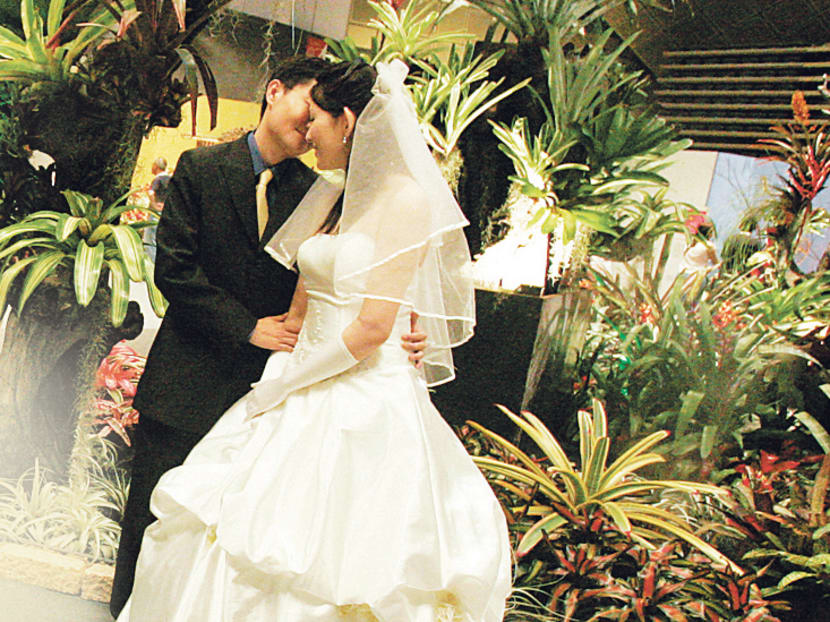New moves to smooth way for transnational marriages here
SINGAPORE — In light of the rising number of marriages between Singaporeans and foreigners here, the authorities yesterday announced new measures from January to allow foreign spouses to start the process of applying for a Long Term Visit Pass (LTVP) earlier.
SINGAPORE — In light of the rising number of marriages between Singaporeans and foreigners here, the authorities yesterday announced new measures from January to allow foreign spouses to start the process of applying for a Long Term Visit Pass (LTVP) earlier.
The changes will also make it easier for them to find jobs after they get hitched to Singaporeans by not subjecting them to a company’s foreign worker quota or levy.
The move came on the heels of Social and Family Development Minister Chan Chun Sing’s announcement on Monday that his ministry would launch new marriage preparation and support programmes for transnational couples.
The number of transnational marriages has grown steadily in the past 10 years, the National Population and Talent Division figures showed. Last year, there were 21,842 marriages registered here involving at least one Singapore citizen. Of these, about 30 per cent — or 6,540 — were between a Singaporean and a foreigner, while the remaining marriages were between two Singaporeans, or between a Singaporean and a permanent resident. In 2003, about 23 per cent — or 4,566 — of 19,458 marriages involving at least one Singapore citizen were transnational.
About eight in 10 transnational marriages were between Singaporean grooms and non-resident brides.
Currently, transnational couples can apply for an LTVP for the foreign spouses only after marriage and have to wait for a few months for the in-principle approval if they are successful. An LTVP allows foreign spouses to stay in Singapore for up to one year before a renewal is needed.
Under the changes, Singaporeans and their would-be foreign spouses can jointly submit a letter of eligibility for an LTVP before marriage. The application process requires both sides to furnish information on family, education and financial backgrounds as well as any criminal records and previous marriages.
It will take up to four weeks for the letter to be processed. After a couple obtains the letter, which will be valid for a year, they can use it to support their application for an LTVP after they tie the knot.
Approval via this application route could be granted within six weeks, instead of six months or more for couples who apply after marriage without the supporting letter.
The Immigration and Checkpoints Authority (ICA) said the change aims to provide greater clarity, before marriage, on whether a foreign spouse can qualify for long-term stay in Singapore, based on the circumstances of the couple at the time of application. The full disclosure by both husband and wife in the joint application will help them get sufficient pertinent information about each other before marriage, it added.
The Ministry of Manpower (MOM) will also issue a letter of consent to foreign spouses with an LTVP when they secure employment. This means they will not be counted against the foreign worker quota of their companies and employers will not be required to pay the foreign worker levy for them.
ICA statistics showed the authority processed an average of 14,600 LTVP applications a year for the past five years. Of these, about 85 per cent were approved.
Sociologists whom TODAY spoke to welcomed the initiatives, which they felt would reduce uncertainties for transnational couples and help start their marriages on the right foot.
National University of Singapore (NUS) sociologist Paulin Straughan said: “There is nothing worse than the uncertainty of whether you can stay together in the same country ... It’s better than now when after they get married, they realise the foreign spouse cannot stay, then all kinds of complications set in.”
NUS sociologist Tan Ern Ser said improving economic opportunities for foreign wives or husbands will help them contribute to the household income and reduce their dependence on their Singaporean spouses.
Agreeing, Dr Straughan said: “(For) somebody who is married to a Singaporean with genuine intentions of setting up a home and building a family here, giving them equal opportunities at the workplace is an excellent start.”
Dr Tan described the letter of eligibility for an LTVP as a “filtering process” that would screen out those who are unlikely to qualify for long-term stay — as well as act as a check against marriages of convenience.
“Now at least ... there’s one more rung of safeguard,” he said. “But of course, as with many things, I don’t think there’s any foolproof method.”
The ICA and the Ministry of Social and Family Development reiterated in a joint press release that marriage to a Singaporean did not automatically qualify a foreigner for long-term stay in Singapore.
They said: “All applications will be assessed on a set of prevailing criteria, including the ability of the Singaporean sponsor to support and look after the family. Every application is assessed carefully and holistically, based on its own merits.”
Last year, 124 people were convicted of marriage of convenience — under a specific provision introduced in August 2012 to criminalise sham marriages — while another 160 were convicted for making false statements in obtaining immigration facilities.







